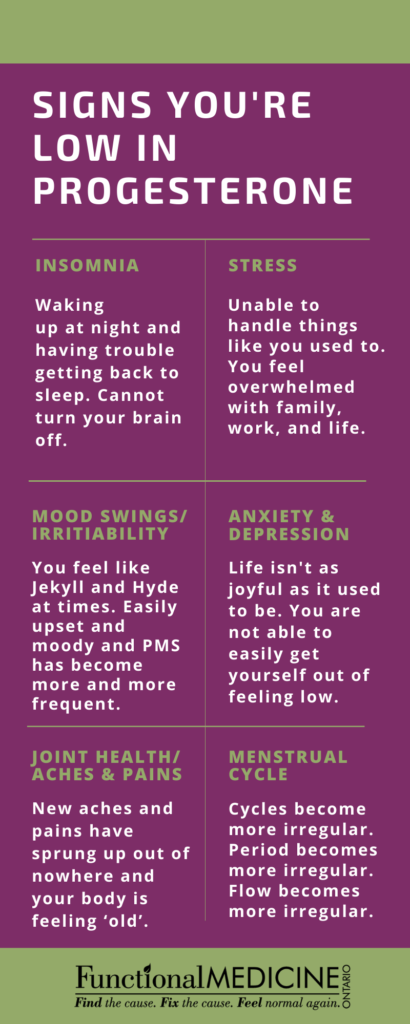(And here’s what you can do about it…)
Tell me if this sounds familiar…
You are a woman in your late 30’s to mid 40’s, and you haven’t been feeling like yourself lately.
You’re having trouble sleeping… you’re moody…maybe even feeling stressed and anxious.
You’re snapping at your kids, your colleagues and your partner. At times you know you’re being completely irrational, but you also feel like there’s nothing you can do about it – almost like it’s beyond your control. Your doctor says “That’s normal for your age” or “It’s just stress”.
Really???
A lot of us just accept this as a “part of life” and “getting older” and try to just push through it as best we can.
You just want to feel like yourself again.
What’s REALLY going on?
What’s causing all this mayhem in your body?
Hormones.
Specifically: Progesterone.
As women, we enter into our childbearing years (PREMENOPAUSE) making abundant amounts of estrogen and progesterone which helps with fertility and allows us to feel youthful, vibrant and full of energy.
Then around our late 30’s to early 40’s we enter into PERIMENOPAUSE and start to feel “older”.
In perimenopause, our ovaries are still making an abundant amount of estrogen but progesterone levels start to drop. For some women, it’s a slow decline and for others, it’s like it’s gone overnight.
This is when we stop feeling like ourselves, too.
Does this sound like you?
Perimenopausal women often have issues with sleep.
Classically, they can fall asleep fine, but cannot stay asleep or sleep very lightly.
I often hear my patients say, “I wake up at 2:30 in the morning and I just can’t get back to sleep.” “Once my brain turns on I cannot turn it back off again.” “I hear the slightest noise and then I toss and turn all night.”
This is because you’re not producing an abundant amount of progesterone anymore.
When progesterone production declines, we see sleep issues.
And with sleep issues then comes energy issues and fatigue, too.
And then brain fog… memory issues… and moodiness.
(Thanks, Perimenopause!)
Perimenopausal women often have issues with stress.
Normal stressors become overwhelming. They feel overwhelmed by life, family, their job, their spouse, even their kids.
They’ll also feel mood swings, irritability, even anxiety. PMS is getting worse and worse. Some patients say it’s so bad they feel a lot like Jekyll and Hyde.
Another common symptom of progesterone deficiency is feeling more aches and pains. Many women shrug this off as “I’m just getting older” or “I’m starting to have arthritis.”
Nope. That’s your progesterone levels dropping.

Lastly, at some point in Perimenopause menstrual cycles will also start change.
They become more irregular.
Sometimes they're longer. Sometimes they're shorter. Sometimes they get lighter (yay!). Sometimes they get heavier (boo!). These are all signs of declining progesterone levels.
So is this how it is? Is this how you get to live for the next 7-10 years?
(That’s how long Perimenopause typically lasts.)
There IS something you can do.
Start Progesterone.
Because I’m the Functional Medicine Doc you’ll often hear me say “Find the Cause. Fix the Cause. Feel Normal Again.”
In this case the Cause is Perimenopause and Insufficient Progesterone Levels.
And, the Fix is to use Progesterone.
Nothing else will work as fast, or as well as Progesterone.
It’s also very safe.
This is the most common question I get about progesterone: Doesn’t it cause breast cancer?
No.
All the best research to date has proven that Progesterone does not increase breast cancer, and that it actually reduces your risk of breast cancer.
It’s inevitable if you are coming into the age of Perimenopause your body is going to experience change (whether you like it or not).
But, it doesn’t mean that life is over, or that you should have to suffer though it all, either.
Make a promise to yourself starting today:
Stop feeling lousy...rotten...awful...crummy...miserable...terrible...crappy.
Find a good Functional Medicine doctor to help you get to the root cause of your health problems.
Like I always say:
Find the cause.
Fix the cause.
Feel normal again!
Dr. Carri Drzyzga, DC, ND – The Functional Medicine Doc
Find the Cause. Fix the Cause. Feel Normal Again!









